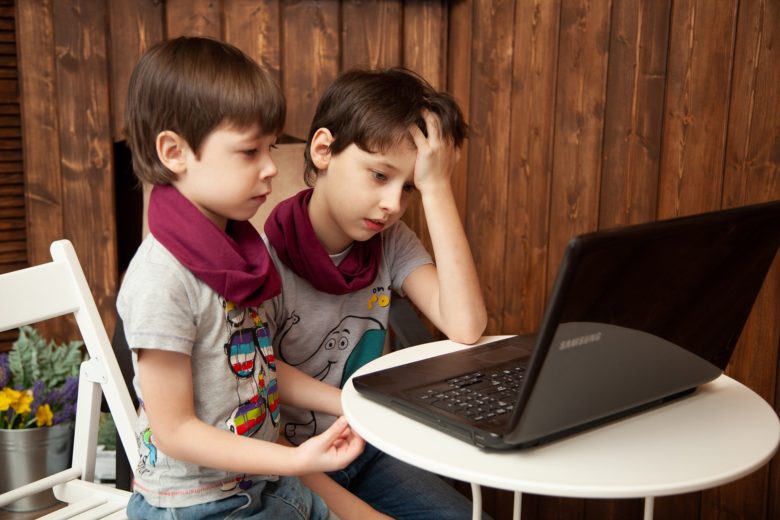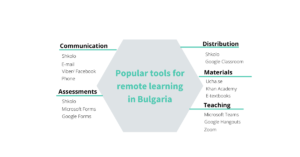Digital Classroom 1.0 In Bulgaria: Generation Gaps, Tech Limitations, Edutainment And Edtech Startups ft. Tech Giants

A bit of chaos and a lot of adjustment, several platforms, some of which went temporarily down due to technical issues caused by the huge traffic, the national TV broadcasting lessons, edtech startups and tech giants involved, a growing number of teachers’ videos that could make Tik-Tok explode right away. This is how the first week of remote schooling in Bulgaria goes. All in all, despite the temporary chaos, the loads of work teachers and school management had to do on the previous weekend, and the emergency measures tech startups had to take to assure the availability of their products – the majority of stakeholders in the new learning order seem to be satisfied.
“Well, we skipped one class because the literature teacher didn’t enter it, and it’s hard for the older teachers,” smiles Alexander, a 12th-grade student from Sofia. His school is using Microsoft Тeams and he is “at school” between 7:30 and 13:00. His class rather enjoys the new form of remote school, especially given the fact that they were just out of flu vacation and totally bored. “I’ve never ‘seen’ everyone listening in the history class. People are just so bored,” tells us Alexander, a 12th-grade student from Sofia.
“It all should have happened much earlier, but the current situation is also an opportunity to finally start using digital technology in the teaching and studying process,” is convinced Irina Filipova, Vice Principle at 119 secondary school “Academician Mihail Arnaudov” and Google Classroom trainer.
Digital classroom: Are tech startups and tech giants friends or foes now
In the past ten days, the Bulgarian educational system (and not only) received a massive boost towards digitally empowered teaching and learning. As it turns out, most of the tools and platforms were right there and used by some, but now they are massive.
As schools had to react quite quickly – between Friday the 13th and Monday the 16th of March, it would be fair to say many of the schools just used what is available. With around 2000 schools in the country, and having in mind the municipality governance of the schooling system, other scenarios were anyway hard to think of. There are however several systems that were already in place: the electronic register by the Bulgarian startup Shkolo, used in around 1200 schools in Bulgaria, the Google Classroom product used by 350, and Microsoft’s products. According to official statements, Microsoft is the only company that The Ministry of Education has contact with, and as of Friday 13th, 800K system profiles were created for students and teachers. The national TV also started broadcasting lessons on March 17th (every weekday between 9:15 – 12:00 and 13:00- 16:00).
Of course, the official tools and platforms are not all that teachers and students are using. Here’s a list of the available and used technologies. Startups like Shkolo.bg and Ucha.se – the digital lessons platform, are also an important part of the picture, with Ucha.se even opening up the platform for free until March 29th, when the remote mode is expected to end.

| What are the different tools for |
| Google Classroom is a free web service that combines Google Drive for assignment creation and distribution, Google Docs, Sheets and Slides for writing, Gmail for communication, and Google Calendar for scheduling. Students can be invited to join a class through a private code, or automatically imported from a school domain. Each class creates a separate folder in the respective user’s Drive, where the student can submit work to be graded by a teacher. |
| Microsoft Teams is a unified communication and collaboration platform that combines persistent workplace chat, video meetings, file storage (including collaboration on files), and application integration. The service integrates with the company’s Office 365 subscription office productivity suite and features extensions that can integrate with non-Microsoft products. Microsoft Teams is a competitor to services such as Slack and is the evolution and upgrade path from Microsoft Skype for Business. |
| Ucha.se is a gamified platform with 16, 000 video lessons and tests developed in accordance with the official school system. It also experienced several interruptions due to the sharp traffic surge. Even before that the company had decided to offer its entire content for free until the 29th of March – normally, an annual subscription costs about 90 euro. |
| Shkolo is a local edtech company and was founded in 2016 to bring digital transformation to schools. Since then over 1200 schools and about 1 million users have started using Shkolo’s platform, which has multiple integrated modules – a digital class register, exchange of study materials, teacher-parent-student communication, testing, payments, etc. |
| Khan Academy is a video tutorial platform that has recently translated some of its subjects into Bulgarian. Also supports the creation of a virtual class, the distribution of lessons and tasks, and the remote assessment of knowledge in relation to the content of video lessons. |
| Zoom is a video conferencing platform. Preferred because it is very easy to use and does not need centralized administration – only the teacher has to make a free profile and send a link to his/her students. In the free version, sessions are limited to 40 minutes. |
Now, of course, the question is who will be the big winners after the necessary digital teaching time is over – will that be startups, or giants, or all.
How do the users feel about the new digital classroom?
As mentioned above, it is a challenge for some of the users, especially the teachers. But students like it. According to Alexander, Microsoft’s product is something like “not too advanced messenger”. “On the second day of the new remote learning, almost the whole class was present. It’s working great so far, I walk around and do exercises while listening to the teacher, we receive tasks..,” adds the 12th-grade student. “I think distant learning runs more smoothly than expected. The first online session was tough, considering the spectacular amount of participants (almost 150 people). The situation has improved, though, due to the new attendance policy. It says nobody is obliged to join the online meetings. In this manner, every class is attended solely by students who are genuinely interested in the given topic/subject,” says Alexandra Dimitrova, also a 12th-grade student but from the 164th Spanish Language High School. She also appreciated the efforts of the teachers to switch to the new mode. “Even though they were pushed out of their comfort zone, they managed to calibrate the whole process and make our graduation possible.”
The challenges with the tech infrastructure
Not surprisingly, there are challenges in switching to remote schooling mode. And as much as some of them are related to the lower level of digital skills of some of the older generation teachers, the technical infrastructure is a much bigger problem. On Monday, the first day of the new order, 89% of the schools were capable of effectively joining the online educational process, stated the Krasimir Valchev, the Minister of Education. For the rest, there were burdens.
The most common reasons are the lack of connectivity and the lack of devices. Nearly 2000 teachers don’t have the technical capacity to provide distance learning. Therefore, the Ministry of Education and Science has started buying equipment to help them. To finance it, the ministry restructures one of the EU-funded operational programs and will be able to quickly allocate between 1 and 2 million BGN (€0.5-1M). Internet connectivity turned out to be the other burden. Broadband internet penetration in Bulgaria was 64% in 2018, show the latest statistics, there’s no exact data on mobile internet penetration. In any case, the Ministry of Education is urgently negotiating with telecom operators new Wi-Fi hotspots in neighborhoods with the highest concentration of kids without internet access.
Not least, the private sector and even startups have experienced technical issues as they were not prepared for the massive traffic. The servers of the digital class register startup Shkolo were down for quite some time. It took the company about 80 hours in total to migrate to a more powerful infrastructure and in the meantime, teachers and students had to find alternatives. A similar situation faced also the digital lessons platform Ucha.se.
Not sustainable in the long run or…
It’s still unclear how long this schooling regime will last. Although most of the schools seem to have found solutions, it doesn’t mean that what they are using now is sustainable in the long run.
For instance, many teachers are using different messaging applications to communicate with students. “This is problematic due to the fact that messengers are not protected educational environment. These applications are for the purpose of interpersonal communication and entertainment, not training. Not least, this does not comply with the General Data Protection Regulation, and we work with students whose data may be available to the school institution. I strongly recommend teachers not to do it,” says Irina Filipova.
Most probably, after this situation is over, some of the schools or at least teachers will keep using their new digital tools, but in order to make the digital education a standard practice, new policies and rules will have to be applied, probably on a more centralized level. Given the situation, everyone is now using rather everything available just to keep the process going, but it doesn’t mean that it’s all compliant and adequate. And what’s after the crisis? Will giants Microsoft and Google come out of this with a huge amount of Generations Z and Alpha users, will more Bulgarian startups finally find their permanent place in the educational system, will teachers be the new Tik-Tok influencers?




























